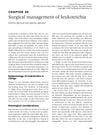37 citations,
April 2018 in “Journal of Allergy and Clinical Immunology” A mutation in the IKZF1 gene causes immune system overactivity, linked to autoimmune diseases like lupus.
 January 2024 in “Endocrine and metabolic science”
January 2024 in “Endocrine and metabolic science” Different types of PCOS need specific diagnosis methods and treatments.
[object Object]  February 2023 in “Frontiers in Endocrinology”
February 2023 in “Frontiers in Endocrinology” Too much male hormone in mothers can negatively affect the sexual behavior of both male and female baby mice.
74 citations,
February 2018 in “Stroke” Women have unique stroke risks due to hormones, contraceptives, pregnancy, and menopause.
 45 citations,
April 2019 in “International Immunology”
45 citations,
April 2019 in “International Immunology” The study concluded that immune cells attacking hair follicles cause hair loss in alopecia, with genetics and environment also playing a role, and highlighted the potential of certain treatments.
16 citations,
January 2022 in “International journal of molecular sciences” Certain daily habits like stress, diet, and sleep can affect the severity of hair loss in alopecia areata.
8 citations,
January 2016 in “Cells tissues organs” Norepinephrine helps skin cells grow, which is important for hair growth.
January 2024 in “Biomedicines” The review shows that skin symptoms like chronic fungal infections, hair loss, and skin depigmentation are key for early detection and management of APECED.
 May 2022 in “Journal of the Egyptian Women's Dermatologic Society (Print)”
May 2022 in “Journal of the Egyptian Women's Dermatologic Society (Print)” Women's hair loss can be due to hormonal changes and various conditions, with treatments focusing on stopping progression and managing symptoms.
92 citations,
September 2013 in “Journal of Investigative Dermatology” BMAL1 and Period1 genes can influence human hair growth.
[object Object] 87 citations,
December 2015 in “Cochrane library” No single treatment is clearly effective for central serous chorioretinopathy.
51 citations,
December 2017 in “Skin Appendage Disorders” Stress may trigger hair loss by affecting immune protection in hair follicles.
 19 citations,
March 2022 in “International Journal of Environmental Research and Public Health”
19 citations,
March 2022 in “International Journal of Environmental Research and Public Health” Certain brain hormones and chemicals are linked to the development of Polycystic Ovary Syndrome.
 9 citations,
October 2017 in “Translational pediatrics”
9 citations,
October 2017 in “Translational pediatrics” Pediatric endocrinologists should provide early fertility counseling and preservation options to young patients at risk of infertility.
8 citations,
March 2010 in “Chinese medical journal/Chinese Medical Journal” Malassezia infection may cause refractory acne, and antifungal treatments can help.
 October 2024 in “Biology”
October 2024 in “Biology” Dermal papilla cells can help regrow hair and are promising for hair loss treatments.

Melatonin and photobiomodulation are effective for treating Alopecia X in German Spitz dogs.

Women with Polycystic Ovary Syndrome (PCOS) have a higher risk of developing type 2 diabetes due to insulin resistance.
September 2022 in “Dermatology and therapy” Androgenetic alopecia is linked to heart disease, metabolic issues, and mental health problems.

Surgical repigmentation can permanently restore color to white hair in vitiligo patients.
 June 2021 in “Reactions Weekly”
June 2021 in “Reactions Weekly” Finasteride caused serious side effects and led to six suicides.
 16 citations,
July 1996 in “Dermatologic Clinics”
16 citations,
July 1996 in “Dermatologic Clinics” Some psychiatric drugs can cause skin problems, but serious reactions are rare.
 35 citations,
December 2014 in “Clinical Obstetrics and Gynecology”
35 citations,
December 2014 in “Clinical Obstetrics and Gynecology” Most skin changes during pregnancy go away after giving birth.
 72 citations,
February 2011 in “American Journal of Biological Anthropology”
72 citations,
February 2011 in “American Journal of Biological Anthropology” The conclusion is that recognizing hair growth cycles can improve the precision of dietary and health assessments from hair analysis.
 4 citations,
October 2019 in “Case Reports”
4 citations,
October 2019 in “Case Reports” A 33-year-old woman with PCOS and metabolic syndrome was unusually diagnosed with a bone condition called DISH, suggesting a possible link between these conditions.
 3 citations,
June 2021 in “Clinical, Cosmetic and Investigational Dermatology”
3 citations,
June 2021 in “Clinical, Cosmetic and Investigational Dermatology” Dermoscopy is an effective tool for accurately detecting skin cancers.
 February 2024 in “Endocrinology and Disorders”
February 2024 in “Endocrinology and Disorders” Balanced hormones are crucial for women's health, and can be managed with lifestyle changes or hormone therapy if needed.
280 citations,
May 2005 in “Andrology” Testosterone treatment for older men can have short-term benefits, but long-term risks are unclear, requiring careful evaluation and monitoring.
227 citations,
November 2004 in “Medicine” Older adults diagnosed with lupus show less severe symptoms but have a lower survival rate, often due to age-related factors.
129 citations,
February 2006 in “Andrology” Men with low testosterone should be carefully evaluated and monitored before and during treatment.
















